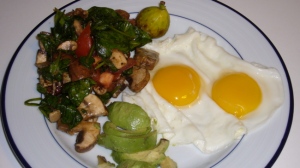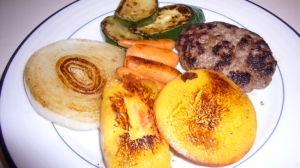Read time: 3 min
Although exercise offers numerous health benefits, it’s not likely to help you lose weight. It will, however, improve body composition by burning some fat and increasing lean muscles, which leaves you looking better. But let’s get one thing straight, weight loss and improved body composition are two different things, the latter being the preferred method to health and fitness.
With that said, if you still want to lose weight for whatever reason (maybe in addition to improved composition), you have to eat fewer calories. You can do this by fasting intermittently using the Eat Stop Eat method (with which I’ve had great success), or any combination of intermittent fasting schedules… which ever fits your lifestyle best!
 But here’s the thing you must understand: the goal is not to simply eat fewer calories for a period of time, but to do so permanently (even beyond reaching your weight loss goal, if you want to preserve your new status). And here’s the tricky part — eating fewer calories will invariably leave you very hungry. For this reason, simply eating less is not sustainable for any length of time, much less an entire life-time.
But here’s the thing you must understand: the goal is not to simply eat fewer calories for a period of time, but to do so permanently (even beyond reaching your weight loss goal, if you want to preserve your new status). And here’s the tricky part — eating fewer calories will invariably leave you very hungry. For this reason, simply eating less is not sustainable for any length of time, much less an entire life-time.
This means, along with eating less, you must change your food choices to include less grain-based carbohydrates and more vegetables, fruits, fats, and meats. And according to David Kessler in his book The End of Overeating, certain foods exert strong control over several portions of your brain, creating an opioid effect no different from that induced by drugs like heroin and cocaine. The result is a powerful addiction that leaves you battling withdrawal symptoms every time you try to eat less.
 Basically these foods trigger a reward sensation, which triggers or reinforces addiction. The dopamine released from such reward increases heart rate, blood pressure, and arterial dilation much in the same way that sex or drugs would. You then anticipate and thus become strongly motivated to seek out more of it. Meaning you’ll think about food constantly in the same way sex or drug addicts think about their vices.
Basically these foods trigger a reward sensation, which triggers or reinforces addiction. The dopamine released from such reward increases heart rate, blood pressure, and arterial dilation much in the same way that sex or drugs would. You then anticipate and thus become strongly motivated to seek out more of it. Meaning you’ll think about food constantly in the same way sex or drug addicts think about their vices.
What are the foods that cause this physiologic state? Generally, manufactured foods that contain “supernormal” flavors — meaning, any food that exaggerates the natural flavors found in nature. The natural sweetness of carrots is exaggerated with the sugar in a carrot cake. The natural saltiness of meat is exaggerated with heavily added sodium in a fast food hamburger. The crunch in vegetables is exaggerated by the fried crisps and salty flavor of french fries or veggie tempura. The supernormal flavoring of “altered” food hits us in the brain, right where it counts for food-industry profit and personal health corruption.


 A return to eating mostly wholesome food is the first step to a dietary rehabilitation that quiets down the chemical pathway developed by addictive foods. As with any rehab — especially that for addiction — this will not be easy. You must truly believe that you want to eat wholesome foods for their nutrients and lower calories, and minimize (or eliminate) processed foods for their excessive calories, supernormal flavors, and addicting qualities.
A return to eating mostly wholesome food is the first step to a dietary rehabilitation that quiets down the chemical pathway developed by addictive foods. As with any rehab — especially that for addiction — this will not be easy. You must truly believe that you want to eat wholesome foods for their nutrients and lower calories, and minimize (or eliminate) processed foods for their excessive calories, supernormal flavors, and addicting qualities.
Another benefit of choosing wholesome, non-grain-based foods is that you’ll control your insulin and leptin levels, preventing potential resistance to either of these hormones. Their mediating health and effectiveness encourage uptake of nutrients by the right tissues, and prevents their uptake by the wrong tissues (fat). This results in proper balance of blood sugar and adequate nourishment of the body, so that the complex feedback system won’t trigger hunger. Insatiation is a symptom of consistently eating the wrong food.
While many diets work, I’ve found that simply eating less and eating mostly wholesome non-grain-based foods low in hyper-flavoring are best for sustainable weight loss. This is not to mention the health that comes with eating truly natural food. Perhaps the simplicity of this plan yields permanent success because the body is built to eat like this through 2 million years of evolution. It’s in the genes.
What have you done personally, and how has it worked for you short term and long term?
 The author, with 6% body fat, at a comfortable and healthy body weight of 155 lbs.
The author, with 6% body fat, at a comfortable and healthy body weight of 155 lbs.


Great post. It makes sense that eating fewer calories would be a battle if the food you’re eating keeps making you hungry. Personally, I found that a period of adjustment was necessary before my body “normalized” itself. I was a carb-fiend and it took several weeks for my body to adjust, my blood sugar to stabilize, and my hormonal responses from food to improve. Now I believe my muscles are fed the nutrients I eat, so I’m not constantly hungry. So far I’ve lost over 15 pounds and counting. No wild energy swings, no mood swings, no hunger.
Thanks for the blog… keep it up!
Damn Ogg, is that really you?
Cut up like a blind man shaving with a straight razor while ridding bumper cars!
That’s me, Grok. I’ve learned my lesson about shaving while riding bumper cars. In all seriousness, there’s something to be said about the Paleo Diet.
Well, my hat’s off to you my friend.
I’ve been consistently leaning out over the last year, but still have a 5-6% or so on you. I have to get my overeating issues resolved. Getting tested to see if I might be feeding bugs in my gut, then I’m getting metabolic typed in hopes of pinpointing something that will help with satiety.
Grok,
Keep us updated on what you’ll find. Hopefully no bug, and just a little bit more time for the result you’re seeking. My physique is a result of several years of eating little to no grains and then every week I try to add:
1 day maximum weight resistance training
1 day body-weight training (usually at home or in the yard and just random)
1 day of metabolic-intense training (sprinting, Crossfit, etc.)
I try to walk everyday with the dog for about 1/2 an hour at shortest. I try to be consistent with these things.
Several friends have asked me how I do it, so I think I’ll add a post concerning this.
Thanks,
Ogg the Caveman
Sounds very doable. I do less heavy stuff, but quite a bit of walking/hiking.
I’m also grain free, but I do a lot of raw dairy. For some people this stalls weight loss. I’ll be cutting it out for two weeks pretty soon, so we’ll see if things pick up.
I have a fast metabolism no doubt, but also a ridiculous appetite (with emphasis on ridiculous). Once I get that issue resolved, we’ll be chasing each other on the bumper cars with Rambo knives 🙂